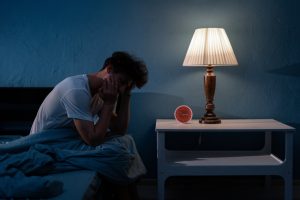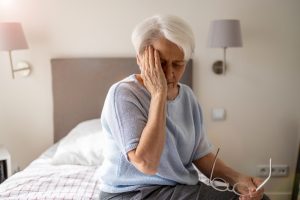Central Sleep Apnea: Understanding This Rare Apnea
Do you often wake up exhausted, even after a full night’s sleep? You may be experiencing the signs of central sleep apnea (CSA). This serious sleep disorder is characterized by diminished respiratory effort during sleep, unlike obstructive sleep apnea, which is caused by a physical airway blockage. CSA can be linked to various underlying health conditions and leads to interrupted breathing and poor sleep quality.
At Sac Sleep & Breathing, Sacramento sleep specialist, Dr. Scott Grivas is here to help you take control of your central sleep apnea and regain the restful, rejuvenating sleep you deserve. Learn more about this rare form of sleep apnea by reading the helpful guide below, or calling our Sacramento, CA, practice at (916) 735-4060.
What Is Central Sleep Apnea?
Central sleep apnea is a sleep disorder characterized by repeated pauses in breathing during sleep. Unlike obstructive sleep apnea, which is caused by physical blockages in the airway, central sleep apnea occurs when the brain fails to signal the muscles to breathe.
This leads to lapses in breathing that can last from a few seconds to a minute or more, disrupting your sleep cycles and leaving you feeling fatigued and unrefreshed. Studies indicate that patients suffering from central sleep apnea have higher mortality rates and increased morbidity, especially those with heart failure.
Signs of Central Sleep Apnea
Some signs of central sleep apnea may include:
- Excessive daytime sleepiness or fatigue
- Frequent waking during the night
- Shortness of breath or gasping during sleep
- Difficulty concentrating or memory problems
- Morning headaches
- Irritability or mood changes
Types of Central Sleep Apnea: Primary Central Sleep Apnea
Central sleep apnea syndromes encompass a range of conditions characterized by the cessation of breathing during sleep due to a lack of respiratory effort. These syndromes are associated with various factors, including demographic prevalence, heart failure, and ventilatory instability. Understanding the different types of CSA is crucial for their management.
Central sleep apnea can be further categorized into several subtypes:
- Idiopathic Central Sleep Apnea: This is the most common form of central sleep apnea, where the cause is unknown. It often occurs in older adults.
- Primary Central Sleep Apnea: This uncommon condition is characterized by multiple central apneas during sleep, often affecting middle-aged or elderly individuals. It is distinct from other forms of central sleep apnea and presents unique challenges in treatment due to its underlying pathophysiology.
- Complex Sleep Apnea: Also known as treatment-emergent central sleep apnea, this develops when someone with obstructive sleep apnea is treated with CPAP therapy, which can unmask an underlying central sleep apnea condition.
- High-Altitude Central Sleep Apnea: Living or traveling to high elevations can trigger central sleep apnea in some individuals due to the reduced oxygen levels.
- Narcotic-Induced Central Sleep Apnea: Opioid medications like morphine or oxycodone can suppress the brain’s respiratory drive, leading to central sleep apnea.
- Central Sleep Apnea Associated with Medical Conditions: Certain health issues like heart failure, stroke, or neurological disorders can contribute to the development of central sleep apnea.
- Severe Central Sleep Apnea: Accurate diagnosis of severe central sleep apnea often requires sleep studies. Treatments such as CPAP and the Remede System are specifically designed to assist with severe central sleep apnea and its associated complications.
The specific type of central sleep apnea you have will influence the most appropriate treatment approach recommended by Dr. Grivas at Sac Sleep & Breathing.
Risk Factors For Central Sleep Apnea
Several factors can increase your risk of developing central sleep apnea, including:
- Heart conditions like heart failure or atrial fibrillation
- Neurological disorders like stroke or Parkinson’s disease
- Certain medications, such as opioid painkillers
- High altitude or exposure to low-oxygen environments
- Older age, with risk increasing as you get older
- Individuals using CPAP for obstructive sleep apnea may develop central sleep apnea, referred to as treatment-emergent central sleep apnea.
If you’re experiencing any of these risk factors, it’s important to speak with Dr. Grivas at Sac Sleep & Breathing to assess your sleep health and determine if central sleep apnea may be the culprit.
Complications and Consequences of Central Sleep Apnea
Cardiovascular Issues
One of the most significant risks is cardiovascular disease. Repeated pauses in breathing during sleep can cause fluctuations in blood pressure, increasing the likelihood of developing cardiovascular issues. High blood pressure is another common consequence, which can further elevate the risk of heart disease, stroke, and kidney problems.
Heart failure is a particularly concerning complication, especially for individuals with pre-existing heart conditions. The strain on the heart caused by central sleep apnea can exacerbate these conditions, leading to more severe health outcomes.
Additionally, the risk of stroke is heightened due to the intermittent drops in oxygen levels during sleep, which can affect brain function and blood flow. Other cardiovascular complications, such as atrial fibrillation and cardiac arrhythmias, are also more likely in individuals with central sleep apnea.
Cognitive Function & Energy Levels
Beyond the heart, this sleep disorder can impact cognitive function, leading to memory problems, difficulty concentrating, and slower reaction times. Excessive daytime sleepiness, a hallmark symptom of central sleep apnea, can significantly increase the risk of accidents, particularly while driving or operating heavy machinery.
Mood & Personality Changes
Mood and personality changes are common consequences of central sleep apnea. Individuals with this condition often experience significant shifts in their emotional state, including increased irritability, mood swings, and a tendency towards pessimism.
Moreover, mood disorders such as depression and anxiety are more prevalent among those with central sleep apnea, likely due to chronic sleep disruption and resulting fatigue.
Diagnosis and Testing for Central Sleep Apnea
Consultation
Diagnosing central sleep apnea involves a comprehensive approach to ensure an accurate assessment. The process typically begins with a detailed medical history, where your doctor will inquire about your symptoms, medical background, and lifestyle habits. This initial step helps identify potential risk factors and underlying conditions that may contribute to central sleep apnea.
Physical Exam
A physical exam is also essential, as it allows the doctor to look for signs of medical issues that could be linked to central sleep apnea. This may include checking for heart or neurological conditions that can affect breathing during sleep.
Sleep Study
One of the most definitive tests for diagnosing central sleep apnea is a sleep study, or polysomnogram. This overnight test monitors various physiological parameters, including brain activity, heart rate, and breathing patterns, to determine the presence and severity of sleep apnea.
For those who prefer the convenience of home testing, a home sleep test can be an alternative. This portable device records breathing patterns and oxygen levels while you sleep in your own bed.
In some cases, imaging tests like chest X-rays or CT scans may be ordered to rule out other medical conditions contributing to central sleep apnea. These tests provide a clearer picture of your overall health and help pinpoint the exact cause of your sleep-disordered breathing.
Treatment Options For Central Sleep Apnea
Fortunately, there are several effective treatment options available for central sleep apnea. Dr. Grivas may recommend:
- Continuous Positive Airway Pressure (CPAP) Therapy: A CPAP machine delivers a steady stream of air to keep your airways open during sleep.
- Adaptive Servo-Ventilation (ASV): This advanced CPAP device automatically adjusts air pressure to prevent breathing pauses.
- Oxygen Therapy: Supplemental oxygen can help maintain proper blood oxygen levels.
- Medication: Certain medications may be prescribed to stimulate breathing or treat underlying conditions.
- Lifestyle Changes: Losing weight, quitting smoking, and avoiding alcohol can all help improve central sleep apnea symptoms.
- Cheyne-Stokes Breathing: Recognizing Cheyne-Stokes breathing, a specific type of breathing pattern characterized by a crescendo-decrescendo pattern, is crucial. It is often associated with central sleep apnea and conditions like congestive heart failure and stroke.
The right treatment plan for you will depend on the severity of your condition and any underlying health factors. Dr. Grivas will work closely with you to develop a personalized treatment approach to get your sleep back on track.
Treatment Devices and Equipment
Treating central sleep apnea often involves specialized devices and equipment designed to regulate breathing during sleep. One of the most common treatments is Continuous Positive Airway Pressure (CPAP) therapy. This involves wearing a mask over the nose and mouth that delivers a constant flow of air pressure, keeping the airways open and preventing breathing pauses.
- For those who need a more tailored approach, Bi-level Positive Airway Pressure (BiPAP) therapy might be recommended. BiPAP devices provide two different levels of air pressure: a higher pressure when you inhale and a lower pressure when you exhale, making breathing more comfortable.
- Adaptive Servo-Ventilation (ASV) therapy is another advanced option. This device continuously monitors your breathing patterns and automatically adjusts the air pressure to prevent pauses in breathing. It’s particularly effective for complex sleep apnea, where both obstructive and central sleep apnea are present.
- Oxygen therapy can also be beneficial, especially for individuals with low blood oxygen levels. This involves wearing a mask that delivers supplemental oxygen during sleep, ensuring your body gets the oxygen it needs.
Tips For Managing Central Sleep Apnea
In addition to medical treatment, there are several steps you can take to help manage your central sleep apnea:
- Stick to a consistent sleep schedule, even on weekends
- Avoid sleeping on your back, which can worsen breathing interruptions
- Practice relaxation techniques like yoga or meditation to reduce stress
- Limit alcohol and caffeine, especially close to bedtime
- Exercise regularly to maintain a healthy weight
- Be aware of high altitude periodic breathing, which can occur following recent ascents to high altitudes (2500 meters or more). This condition is related to the pathophysiology of central sleep apnea and involves changes in ventilatory control that lead to periodic breathing patterns.
By making these lifestyle adjustments and working closely with Dr. Grivas at Sac Sleep & Breathing, you can gain control over your central sleep apnea and enjoy the restorative, uninterrupted sleep your body needs.
Frequently Asked Questions
Can central sleep apnea be cured?
While central sleep apnea cannot be cured, it can often be effectively managed and controlled through CPAP treatment, oxygen therapy, or adaptive servo-ventilation devices.
Can central sleep apnea be life-threatening?
Yes, sleep apnea syndrome can be a serious condition that increases the risk of other health problems if left untreated, particularly in patients with heart failure where it is associated with increased mortality rates. Repeated breathing interruptions can lead to low oxygen levels, cardiovascular strain, and heightened risks of heart attack, stroke, and other complications.
What are the long-term effects of untreated central sleep apnea?
Untreated central sleep apnea can have serious long-term consequences, including high blood pressure, heart disease, stroke, diabetes, and cognitive impairment. It’s important to seek treatment from a qualified sleep specialist like Dr. Grivas to avoid these dangerous health outcomes.
Learn More About This Rare Apnea & How To Treat It, Call Today!
If you’re struggling with the symptoms of central sleep apnea in Sacramento, don’t wait to get the care you need. Dr. Grivas and the team at Sac Sleep & Breathing are here to help. Contact us at (916) 735-4060 today to schedule a consultation and take the first step toward reclaiming your healthy, restful sleep. We welcome patients from Sierra Oaks, Woodside Condo, Campus Commons, and the Sacramento, CA, area.
